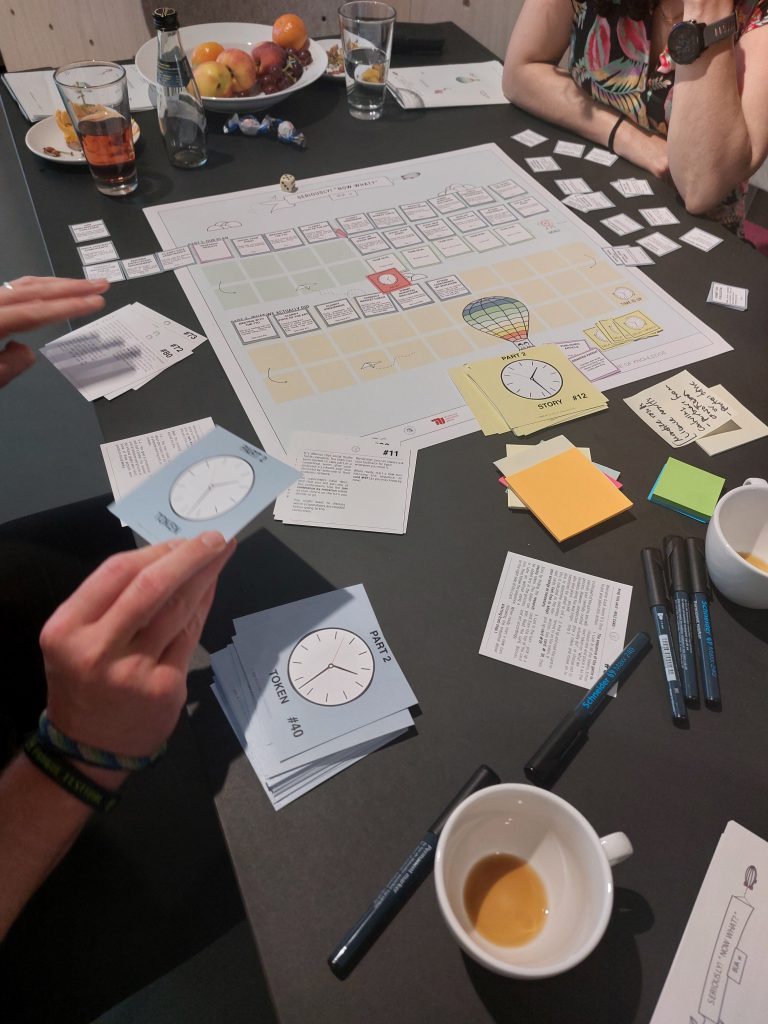
SERIOUSLY! NOW WHAT? – A TECHNOLOGY TRANSFER EXPLORATION
The game was developed in collaboration with the Technische Universität Berlin (TUB) and funded by the Berlin University Alliance (BUA) as part of its Postdoc Academy. Although it was designed for researchers, its learning objectives are relevant to anyone interested in sharing perspectives and improving their understanding of technology transfer through simulation—key strengths of the collaborative serious game approach to learning.
TECHNOLOGY TRANSFER FOR INNOVATORS
The game brings players together in small groups to explore how technology transfer works in practice and its role in their research and future careers. Players take on the role of a research group working on a fictional project and are challenged to develop their ideal technology transfer process, aiming to secure and commercialize their results successfully. They must define their goals, decide on actions and their sequence, and plan how to secure their findings. Once their plan is in place, they navigate ‘real-life’ scenarios to stress-test their plan in a simulated environment.
The game’s main objectives are to provide insight into the added value of technology transfer and help players understand its challenges, strategies, and success factors. This is achieved through knowledge exchange, where players learn from each other’s experiences as well as inputs from the Technology Transfer Office (TTO) of the university. To progress through the game, players explore how to plan for technology transfer, dealing with common challenges that may occur before and during transfer, as well as tackling hurdles such as publishing results before patenting and licensing. The game uses realistic scenarios that players can relate to, facilitating the exchange of experiences. To complete the game, player groups will have to discuss, share, and use their prior knowledge and experience and work together as a team to be able to solve complex problems.
The game is played using a board to map out the planned technology transfer process, along with two decks of cards – one for situation story events and another for guiding team decisions during play. The game also uses a guiding booklet providing theoretical insights and key takeaways, which the players can keep after the game is completed. Magnus Hakvåg (CEO, House of Knowledge) and/or Dipl.-Ing. Jeanne Trommer, Dr. Christine Oesterhelt, and Dr. Caroline Reid (TUB Research and Technology Transfer Department) facilitate the game to ensure an engaging and insightful player experience.
EXPECTED OUTCOMES
Playing “Seriously! Now What?” allows participants to share their experiences and learn from others’ perspectives. The game fosters knowledge exchange, offering fresh insights and best practices in technology transfer. Engaging diverse groups, it encourages interorganizational learning, helping players understand how technology transfer works beyond their organizations. This broadens their perspective and deepens their appreciation of different approaches. The exchange of ideas can lead to improved technology transfer practices at both individual and organizational levels. Additionally, the game’s collaborative problem-solving design helps players develop new skills, enhance teamwork, and gain valuable tactic nowledge.
In addition to being used by novices for getting an understanding of technology transfer importance, the game can be used by technology transfer experts as a platform for exchanging ideas and insights. As such, it complements the “Serious Tech Transfer Game” described in a previous article, which was designed especially for experts. Thus, “Seriously! Now What?” can be used by technology transfer organizations for educational, outreach, and dissemination purposes. For even deeper learning, the two games may also be played in sequence.
HOUSE OF KNOWLEDGE
House of Knowledge is a Norway-based company specializing in capability building and serious game development. Collaborating globally with universities, NGOs, and industry partners, the company designs games that foster collaboration, knowledge exchange, and skill development. With expertise in intellectual property (IP) and technology transfer, the House of Knowledge has created multiple serious games for organizations like WIPO and LESI and has developed games for data extraction, governance, and cross-cultural exchange in EU-funded research projects.
THE BUA POSTDOC ACADEMY
The BUA Postdoc Academy is a program of the Berlin University Alliance, a consortium of the four leading scientific institutions in Berlin: The Freie Universität Berlin, the Humboldt Universität, the Technische Universität, and the Charité – Universitätsmedizin. The Postdoc Academy aims to provide support for postdocs of the BUA institutions in their career development. The primary task is to assist postdocs in making informed and individually good career decisions. It creates an environment where postdocs can recognize their own strengths, acquire necessary competencies, and build relevant knowledge and skills. A key aspect of this process is networking: the BUA Postdoc Academy promotes exchange and interdisciplinary networking between postdocs and other actors in the scientific community.
Håvard Almås

Håvard Almås is a researcher at House of Knowledge and an industrial Ph.D. candidate of organizational psychology jointly at the Norwegian University of Science and Technology (NTNU) and House of Knowledge. His research interests include collaborative learning, teamwork, engagement in play, serious games, and organizational development more broadly. Previously he has been engaged in research on the digital transformation of non-digital board games, the formation of learning experiences in serious games, and the emergence of collaboration in small player groups.
ORCID: https://orcid.org/0000-0003-0004-3679
 EN
EN